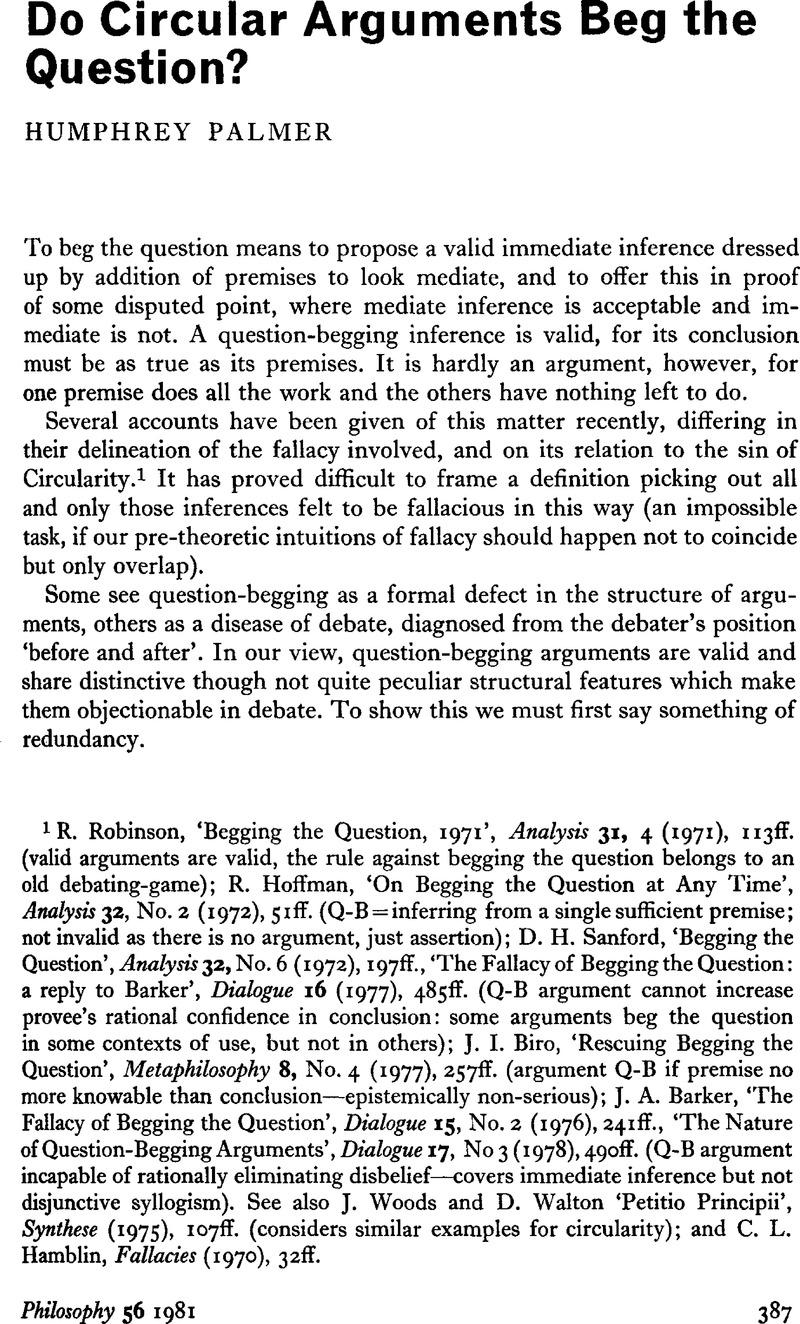Published online by Cambridge University Press: 30 January 2009

1 Robinson, R., ‘Begging the Question, 1971’, Analysis 31, 4 (1971)CrossRefGoogle Scholar, 113ff. (valid arguments are valid, the rule against begging the question belongs to an old debating-game); Hoffman, R., ‘On Begging the Question at Any Time', Analysis 32, No. 2 (1972)Google Scholar, 51ff. (Q-B=inferring from a single sufficient premise; not invalid as there is no argument, just assertion); Sanford, D. H., ‘Begging the Question’, Analysis 32, No. 6 (1972)CrossRefGoogle Scholar, 197ff., ‘The Fallacy of Begging the Question: a reply to Barker’, Dialogue 16 (1977), 485ff. (Q-B argument cannot increase provee's rational confidence in conclusion: some arguments beg the question in some contexts of use, but not in others); Biro, J. I., ‘Rescuing Begging the Question’, Metaphilosophy 8, No. 4 (1977)CrossRefGoogle Scholar, 257ff. (argument Q-B if premise no more knowable than conclusion—epistemically non-serious); Barker, J. A., ‘The Fallacy of Begging the Question’, Dialogue 15, No. 2 (1976)CrossRefGoogle Scholar, 241ff., ‘The Nature of Question-Begging Arguments’, Dialogue 17, No 3 (1978), 490ff. (Q-B argument incapable of rationally eliminating disbelief—covers immediate inference but not disjunctive syllogism). See also Woods, J. and Walton, D. ‘Petitio Principii’, Synthese (1975)Google Scholar, 107ff. (considers similar examples for circularity); and Hamblin, C. L., Fallacies (1970)Google Scholar, 32ff.
2 Cf. Barker (1976), 249. In some arguments it is not clear which premise is redundant. Consider ‘Monks exist, and some of them are scrupulous, but none are practical. Some impractical people are monks but none are unscrupulous’. The conclusion ‘some monks are scrupulous’ can be drawn in three different ways, making different premises redundant. But the argument is inefficient, in each case.
3 Addition puzzles people. Can one snatch from thin air assertions hitherto unknown? They were not known before, and the air is thin, no doubt, and they are snatched; but they are not assertions, only posited-premises. ‘If X follows from Y, I'll tell you something else it’ll follow from …
4 Which of us can state—or spot—the super-implicants of all his non-beliefs?
5 See H. Palmer, ‘The Transcendental Fallacy’, forthcoming in Kantstudien.
6 Barker, (1976), 247Google Scholar, considers the argument would beg the question if ‘benevolence is a virtue’ were presupposed.
7 I have been further assisted, in writing this, by comments from Mr D. M. Evans and Mr A. Belsey.